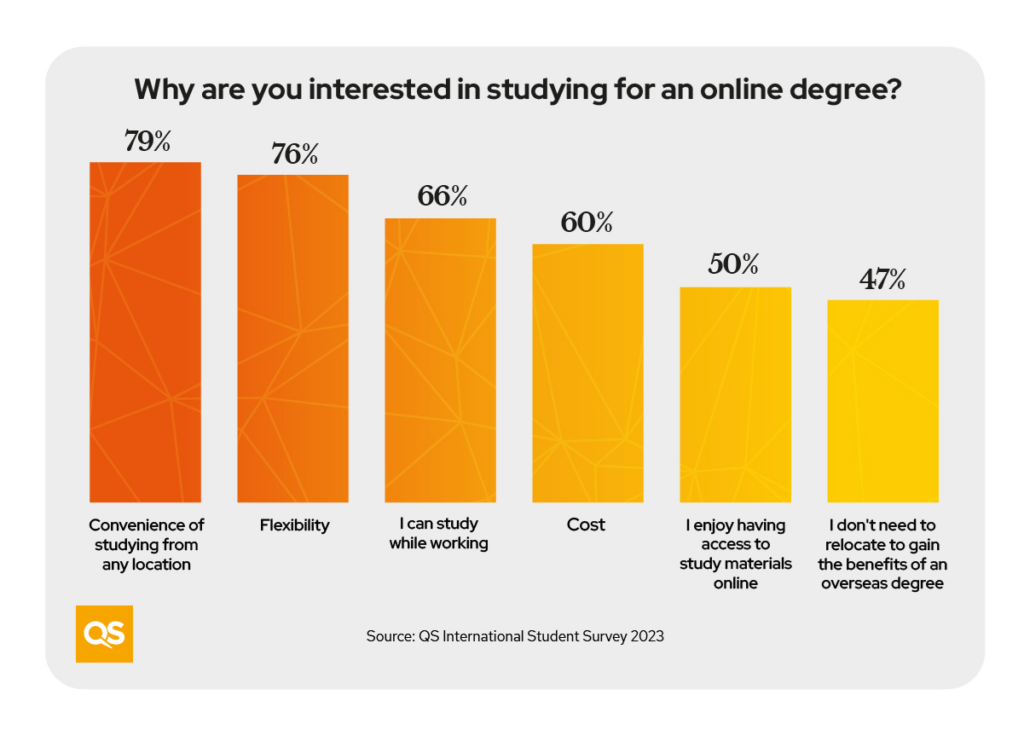
Online study continues to be important in a post-COVID world. While global higher education looks towards a more hybrid future – with many universities offering in-person and virtual learning opportunities, regardless of programme – fully remote courses still hold value for many, for various reasons.
When asking students from the UK to think about their reasons for choosing an online learning programme, flexibility and cost are clearly the biggest draws.

As we gear up for the release of the QS World University Rankings: Online MBA 2024 on 24 April, we spoke to Leila Guerra, Vice Dean (Education) at Imperial College Business School.
Imperial’s Global Online MBA programme secured its place in the top 10 of the QS Global MBA Rankings 2024: Europe upon the ranking’s release back in October 2023.
Leila’s role as Vice Dean of Education consists of directing and overseeing their programme portfolio and setting the educational strategy and vision to ensure an “outstanding postgraduate and undergraduate experience.”
Setting themselves apart
Leila highlighted several distinguishing features of the online programme compared to other institutions’ offerings:
- “A highly selective admissions process”
- “Our platform ensures that online learning is interactive and social”
- “Shared elective modules on campus enable students to engage in global experience modules and exchange experiences” despite being an online programme.
“They aim for professional development but also social impact and are committed to achieving positive change and shaping the future.”
Key traits of the ideal candidate
“Our candidates are ambitious, creative, and proactive individuals with a particular interest in the power of technology and innovation in a global context. We look for students who can leverage their networks and resources, demonstrating promising leadership potential and a track-record of driving innovation and collaboration. They aim for professional development but also social impact and are committed to achieving positive change and shaping the future.
“As part of a world-leading STEMB university, focused on developing Science for Humanity, we look for candidates with an entrepreneurial mindset, who are high-performing, curious, innovation-driven, and open to new concepts, methodologies, and challenges.”
The impact of Online MBA programmes on skill development
“Online study requires self-discipline and time management, and the Global Online MBA programme further hones these skills. Having a deep understanding of digital communications, online team building, virtual leadership, remote collaboration tools, strategies to develop a sense of belonging in hybrid teams or overcoming the barriers of networking through a ‘screen’, – these are important skills that students can apply to their workplaces and are essential in today’s increasingly digital workplace.
“The online format means that the programme attracts many professionals who would otherwise struggle to take the time out for studying. We take action to create a cohesive cohort and the flexibility afforded by online delivery.
“The experience of being part of a global cohort that is locally based in countries all around the world, exposes students to very diverse business practices and real-life viewpoints. This makes them more adaptable and fosters a truly diverse mindset.
“At Imperial, we value the importance of a cohort-based approach to develop the student’s sense of belonging and ensure they are always supported by their academic directors and other student-facing professional staff. However, our programmes are not on-demand – there is live discussion and interaction throughout so that we can properly address the needs of individual students.”
Who does the Global Online MBA attract?
“Our reputation as a world-leading university attracts high-calibre students from across the globe. Our current intake represents 50 different nationalities drawn from all corners of the world. It represents a diverse range of industries, ranging from Pharma to Tech to Banking, Energy, Consulting and Finance – individuals with demanding careers who want to pursue an MBA whilst balancing their other commitments, and we allow this with our part-time format with exit points at 21, 24, or 32 months – which gives students a more flexible study experience. “The programme also caters to professionals who are seeking to refine their expertise in specific disciplines, gaining deeper insights to better equip them with the knowledge and skills to advance in their career or move to another industry.”
Cracking the code
Shedding light on Imperial College Business School’s perfect employability score of 100 in the QS Online MBA Rankings 2023: Europe, Leila says, “We are very privileged to work closely with students and recruiters to understand their needs in a changing environment, adapt to these challenges and facilitate connections. Each student is allocated a dedicated careers consultant, and our Careers team builds a strong relationship with the cohort to support each student within their own specific context.
“This is an area where we will continue to invest, to offer lifelong learning and lifelong employability support. Often there is a perception that online students require less support, and business schools need to ensure they have access to all the relevant tools, networks, and opportunities.”
According to the QS Global Employer Survey 2023, the largest discrepancy in skill importance versus satisfaction among employers lies in ‘resilience and flexibility’ among MBA graduates.
Strategies for enhancing soft skills
“Through the Personal Leadership Journey (PLJ) which is integrated into the programme, students are equipped with critical insights and tools for personal and professional growth –fostering reflective leadership practices and developing skills to enable them to thrive in complex global environments.
“The PLJ integrates personal development (e.g. helping students to understand their strengths and how to use the in a balanced manner) with leadership development masterclasses and external speakers, including ‘Building resilience for Career and Leadership success’, ‘Achieving sustainable peak team performance’ and networking.”
The need for adapting to lifelong learning
“In the past few years and since the pandemic, we have seen a significant change in the higher education landscape – further accelerated by new generations of learners that demand flexible learning, and employers that need to address their skills gap.
“Industries and Technologies advance at an unprecedented pace, as constantly discussed. We need to pay equal attention to learners’ agency and the new educational models that are emerging. The MBA is evolving, and business schools, accreditation and rankings bodies need to address if they are delivering to vision and mission. Adapting to students’ evolving lifelong learning needs is crucial because candidates no longer consider their journey as a one-off activity, but a continuous cycle of upskilling, reskilling, and evolving.
“As we prepare to offer dynamic, flexible education that can be personalised and accessed at the relevant stages of someone’s life, we need to break down the stereotypes of the MBA and integrate lifelong learning as an integral part of our mission.”
What are the top tips for delivering high-quality programmes online post-pandemic?
“At Imperial, we ensure our online programmes are as impactful as our in-person courses.
“Focus on student-centric, high-quality delivery, embed the latest technologies required for online audiences, ensure your pedagogical approach is specifically tailored to online learning, embed and test them by communicating constantly with your online cohorts to learn and adapt, ensure online student voices are represented and celebrate them as an important part of your business school.”



